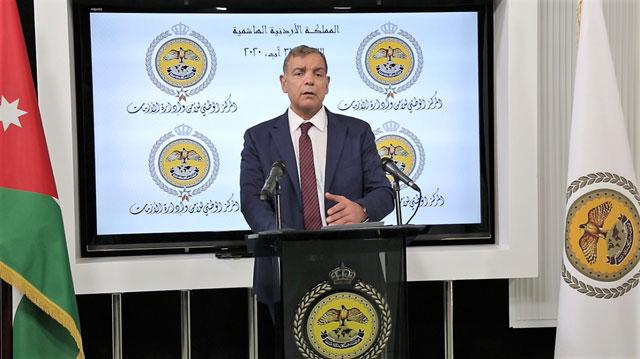You are here
Jordan records 16 local infections, 4 cases from abroad on Monday
By Maram Kayed - Aug 17,2020 - Last updated at Aug 17,2020

A healthcare worker uses a swab to collect sample from a man during a random coronavirus test in Amman in these recent photograph. More than 6,100 virus tests were conducted on Monday, increasing the total number of tests to more than 689,600 since the outbreak of the pandemic, according to authorities (Photo by Amjad Ghsoun)
AMMAN — The government on Monday affirmed that it will not reimpose a national lockdown in light of a spike in the number of local COVID-19 cases.
Twenty COVID-19 cases, including 16 local infections, were registered in the Kingdom on Monday, increasing the caseload to 1,398, Health Minister Saad Jaber announced during joint a press conference with Minister of State for Media Affairs Amjad Adaileh at the Prime Ministry.
Adaileh said that the Kingdom is now in the “lower-mild/blue” stage of the pandemic, which initially meant that universities and schools will not be allowed to open, but the condition has changed.
“Originally, the government was only going to open schools, universities, mosques and churches when the Kingdom was in the green stage, [occurrence of no local cases for 10 consecutive days] but we have amended that,” Adaileh said.
Despite Adaileh calling the rise in local infections “concerning” in the past week, the government’s five-stage response plan does not impose a national lockdown in the blue stage neither on Fridays nor any other day.
“A national lockdown has dire economic, social and mental health consequences on citizens, so the government is trying its best to avoid it, with only partial lockdowns imposed on regions or cities with high number of cases,” added Adaileh.
The press conference also highlighted His Majesty King Abdullah’s efforts to improve the quality of health services being offered to citizens in terms of beds, ventilators and the number of hospitals.
The local cases included four infections in Irbid, nine in Amman, two in Balqa and one in Zarqa, according to the health minister.
The cases from abroad included two Jordanians returning from the US and Saudi Arabia in addition to two truck drivers returning to the Kingdom through the Omari border crossing, Jaber added.
Five recoveries were reported on Monday from quarantine hotels in the Dead Sea area, increasing the total number of recovered patients to 1,258, he noted.
Five COVID-19 cases are admitted to the intensive care unit, with one patient in critical condition.
More than 6,100 tests were conducted on Monday, increasing the total number of tests to more than 689,600 since the onset of the pandemic.
Jaber noted that two new hospitals, the new Salt Hospital and the new Emergency Hospital affiliated with Al Bashir Public Hospital are “significant efforts exerted in improving the Kingdom’s pandemic response as well as its health sector in general”.
Adaileh said that “the government relies on citizens’ awareness”, citing a study that showed that more than 57 per cent of citizens are not aware of the virus’ threat.
The media minister said that almost 8 per cent of citizens believe that the virus is non-existent or is part of a conspiracy theory, a notion he said is “disproved by the 700,000 deaths worldwide due to the virus”.
Adaileh also urged the public and establishments to abide by Defence Order 11, which commits people to wear face masks and gloves while in public.
He also pointed out that 28 establishments have been closed and 51 fines and 22 tickets issued for violations.
The health minister called on citizens to download the "Aman app" (Safety), which he said had sent more than 450 messages to citizens who had been in close proximity with COVID-19 positive cases.
“This is an app that can protect you, your family and the Kingdom as a whole,” Jaber said.
Also on Monday, Amman Governor Saad Shihab said that seven residential buildings were isolated after reporting COVID-19 infections, the Jordan News Agency, Petra, reported.
The governor said that three buildings are in Sahab, two in Al Muwaqqar, one in Al Ashrafiyyeh and one in Jabal Al Hussein.
A police patrol team has been stationed at the entrance of each building to prevent people from leaving or entering them until epidemiological investigation teams take samples from their residents.
Related Articles
AMMAN — Sixteen COVID-19 cases, among them 14 local infections, were registered in the Kingdom on Monday, increasing the caseload to 1,268,
AMMAN — The Kingdom on Saturday recorded 10 COVID-19 cases, including nine local infections, increasing the caseload to 1,339 since the outb
AMMAN — Sixty-eight COVID-19 cases, including 46 local infections, were registered in the Kingdom on Monday, increasing the caseload to 2,03
















